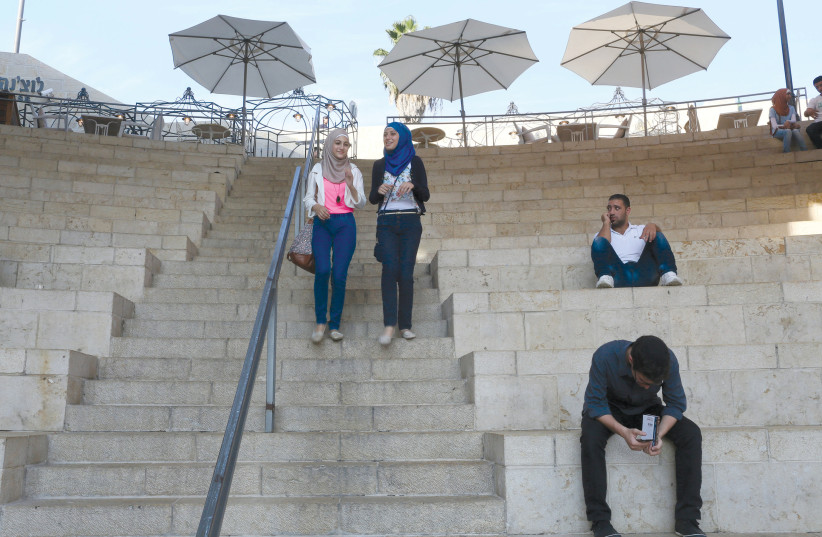Last week, on a Lufthansa flight, two Jews refused to wear masks in violation of the rules. The airline decided that, as the regulation had been flouted by Jews, it would punish dozens of other Jews on the same flight, who were identifiable by their hassidic attire. This generalization, which reeked of blatant antisemitism, was universally denounced. Lufthansa apologized.
But, just as we are revolted by generalizations made abroad about Jews, so should we deplore the generalizations heard in Israel about Arab Israeli citizens. And these are legions: you hear them at soccer games, in the media, in the Knesset – everywhere. The generalizers reveal themselves as heartless, ignorant and blind. How?
On the security front, it has only just come to light that the lieutenant colonel who died defending Israel three years ago in a daring operation in Khan Younis was an outstanding Druze officer. The flowers have not yet withered on the grave of the Arab police officer killed while defending citizens in Bnei Brak. Also recently, three Arabs with Israeli identity cards were among the perpetrators in deadly terrorist attacks in Beersheba, Hadera and Bnei Brak. One would have to be heartless to desecrate the memory of two Israeli heroes and lump them together with the cruelest of terrorists, just because they are all non-Jews.
In the political sphere, the Ra’am Party is the linchpin of the government led by a former director-general of the Yesha Council. The head of Ra’am, an Islamist, recognizes Israel as the nation-state of the Jewish people and wants to build civic bridges between the communities. At the same time, the head of the Joint List undermines this civic partnership by calling upon police officers of Arab descent to resign. One would have to be in a pit of ignorance to classify them together just because they are both Arabs.
On the civic level, we are witnessing rising violence on the Arab street that challenges the rule of law. And yet, in these same streets, the best of civic Israel grows: This month, for the first time, a Muslim Arab from Jaffa was appointed a Supreme Court justice. The bank founded by Herzl for the Zionist movement, Bank Leumi, is headed by an Arab Israeli citizen who hails from Tayibe. Israel’s coronavirus commissioner is a Druze physician. The list is long and impressive. One would have to be blind to put the builder and the destroyer into the same category simply for ethnic reasons.
The only conclusion is this: We must not generalize. Just as the Jewish identity of the two Lufthansa passengers cannot be used as a common denominator for collective judgment of the behavior of other Jewish passengers, so too should the non-Jewish identity of Israeli citizens not be used as a common denominator for collective judgment of their behavior.
Unfortunately, ascribing inherent traits to others according to some reference group is a common human practice, because it allows us to simplify a complex picture and translate it dichotomously: us and them. It purports to absolve the generalizer of responsibility and empathy toward others; in particular, it reinforces our own self-image. As though others – whether they are an Arab, a settler, a leftist, or the bearer of some other label – cast a dark shadow on reality, while we, the mirror image, are on the side of light.
Those who generalize about Israel’s Arab citizens are not just heartless, ignorant and blind; they are also racist, in that they regard people according to their ethnic background rather than their behavior. They also abandon basic Jewish morality. Who doesn’t remember the argument our ancestor Abraham, the first Jew, had with God in opposing the monolithic attitude toward the people of Sodom: “Will you even destroy the righteous with the wicked?”
Racist generalizations brand the others as dangers in our collective consciousness, without bothering to look at their personal, individual face. That is the reason why Israel has not yet included the value of equality in its emerging constitution. Equality, the human intuitive preference, would be accepted by the Jewish majority if it could internalize the positive everyday impression made by nearly two million law-abiding Arab citizens, whose lives are fully interwoven in the fabric of the Israeli experience.
The rectification needed is clear: in the 2018 Basic Law, Israel – the nation-state of the Jewish people, the Knesset failed to stipulate that the state of Israel would treat all of its citizens equally, Jews and non-Jews alike; it should amend the law to reflect this. That is the practice of all democratic ethnic nation-states: state identity is particularist, reflecting the national identity of the majority group, but they commit themselves, in their constitutions, to treat all of their citizens equally, including those who do not belong to the dominant nationality.
In the Declaration of Independence, which designates Israel as the nation-state of the Jewish people, we promised the world and ourselves that full civil equality would prevail here. The time has come to make good on that promise. All citizens, including non-Jewish Israeli heroes, are entitled to equality in Israel.
The writer is president of the Jewish People Policy Institute and a professor of law at Bar-Ilan University.

